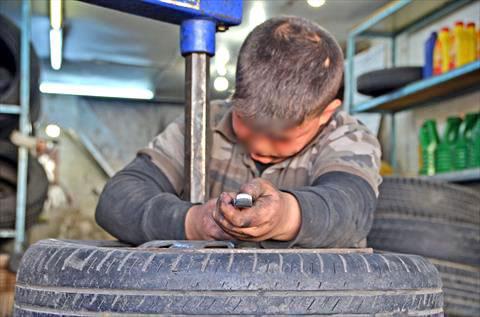- Local News
- Sun-2021-02-28 | 02:50 pm

Child labour has become a serious issue in Jordan, especially during the pandemic, according to officials.
The National Child Labour Survey in 2016 showed that close to 76,000 children in Jordan are engaged in economic activitiy, 60 per cent of whom are engaged in hazardous work, including working with dangerous machinery, tools or heavy loads, working long hours or during the night, as well as in unhealthy environments such as landfills and recycling plants.
On November 20, 2020, on the occasion of International Children’s Day, the Jordan Labour Watch issued a position paper stating that the number of working children is increasing significantly, with most of them sent by their families in order to help secure basic household needs.
The paper emphasised that the COVID-19 crisis increased poverty rates in Jordan, sending more children into the labour market, especially in light of the implementation of distance education where students need not attend in-class education.
Child labour is the result of many complex factors, including poverty, social norms, lack of decent work opportunities for adults and adolescents among others, according to officials.
"The insistence on online education is not justified, instead, I believe the government must strengthen the control over health and safety measures in schools,” Ahmad Awad, director of the Phenix Centre for Economic and Informatics Studies told The Jordan Times.
Child workers work in different sectors, mostly in the construction, blacksmithing and the machinery and auto repair sectors, exposing them to many risks, according to officials. Upbringing of children workers in such hazardous environments makes them more prone to be involved in criminal activities as they grow up, Awad noted to The Jordan Times.
Working children are subjected to numerous violations in their workplace, in terms of their exploitation in the labour market, receiving low salaries, working long hours, and working in jobs that are not commensurate with their physical capabilities, he said.
"To effectively address child labour, it’s important to look at the full set of vulnerabilities faced by children and their families to address the root causes and integrate the response across social protection, education, justice and labour market policies,” Tanya Chapuisat, representative of UNICEF Jordan, told The Jordan Times.
Child labour can result in extreme bodily and mental harm, even death. It can lead to slavery or sexual and economic exploitation. Moreover, in nearly every case of child labour, the child is cut off from schooling and healthcare, restricting children’s fundamental rights and threatening their futures, Chapuisat said.
"These children are often invisible, working out of sight in dangerous and hazardous environments such as industrial recycling facilities, vegetable markets and landfills. There are also children working on farms, in shops and on the streets,” Chapuisat said.
The ministries of Labour and Social Development work on both preventing and responding to this issue. The government has put in place a national social protection strategy to break the intergenerational cycle of poverty and provide a "social protection floor” in the context of the Kingdom’s vision for a state of solidarity, production and justice, according to the UNICEF official.
"A robust social protection system is critical to reduce the burdens of low-income families and their reliance on negative coping mechanisms, including sending children to work to earn an income,” Chapuisat said.
"UNICEF recently launched a new programme with partner Rowad Al Khair where we are working closely with government and local authorities in Zarqa and Amman to prevent child labour, help children escape from dangerous working environments and get them back to learning,” she said.
This programme aims to support families who are vulnerable to economic shocks, including the negative impact of the COVID-19 pandemic. Trained social workers work directly with families and communities to identify, prevent and manage the risks of child labour and tailor a response specific to their needs,” Chapuisat said.
As part of this programme, 400 of the most vulnerable child labourers, boys and girls, of all nationalities, aged 6-18 years will receive psychosocial support and help to access education, life skills, entrepreneurship opportunities and training. Families of children at-risk of child labour will be assisted with a package of specialised support, as well as information on the negative impacts of child labour and access to livelihoods opportunities and cash assistance, she said.
"The large number of Syrian refugees has played a major role in the spread of child labour in Jordan,” Haifa Darwish, head of the Inspection Section for Reducing Child Labour, Ministry of Labour, told The Jordan Times.
The percentage of working children in relation to the total number of children in Jordan is 0.08 per cent, which, while still an issue of concern, is a very low figure, Darwish added.
According to Jordanian non-governmental organisation Tamkeen for Legal Aid and Human Rights’ Syrian Refugee Child Labour in Jordan and The Risk of Exploitation Report 2015, the Jordanian government estimated the number of working Syrian children at 30,000 at the time.
Darwish noted that the Ministry of Labour works to ensure that the law is implemented through labour inspectors and that appropriate legal action is taken against the employer of children.
"The Ministry of Labour in cooperation with the Jordanian Hashemite Fund for Human Development, is working on a project that would make it possible to transfer child labourers found by the ministry’s inspectors to a care centre, providing several services for them, including a programme to return them to schools,” Darwish said.









